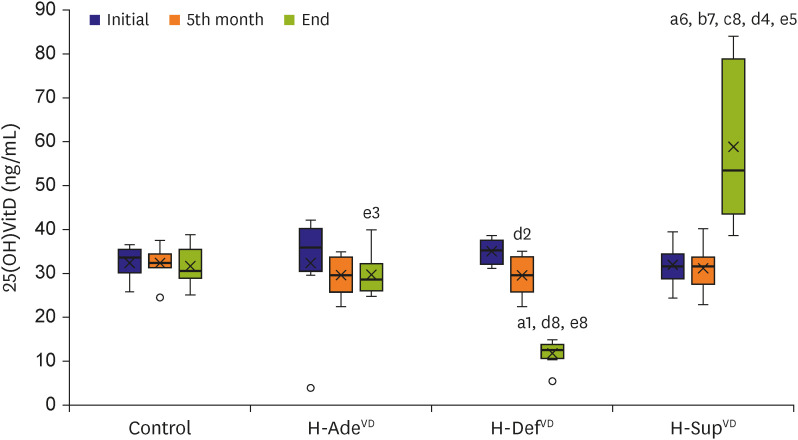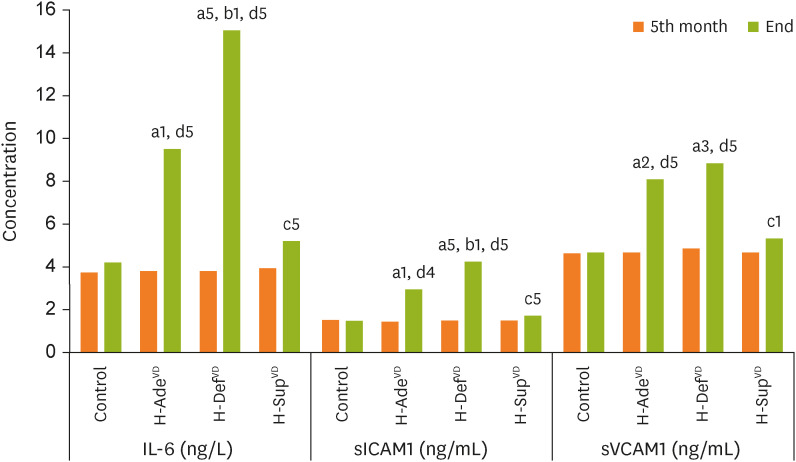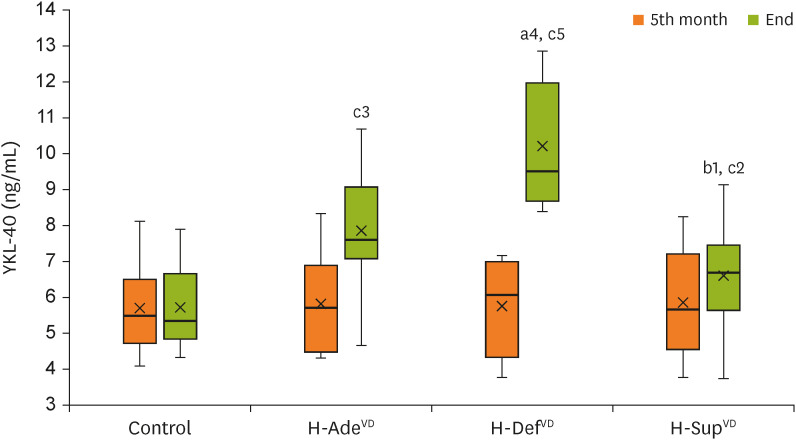Korean Circ J.
2023 Feb;53(2):92-102. 10.4070/kcj.2022.0282.
Effect of Vitamin D on YKL-40: Rat Hypercholesterolemia Model
- Affiliations
-
- 1Department of Biochemistry, Karamanoğlu Mehmetbey University School of Medicine, Karaman, Turkey
- KMID: 2539486
- DOI: http://doi.org/10.4070/kcj.2022.0282
Abstract
- Background and Objectives
YKL-40 is considered to be associated with cardiovascular disease (CVD). In this study, the effect of serum 25(OH) vitamin D [25(OH)VitD] differences between groups on YKL-40 was evaluated on a hypercholesterolemia rat model.
Methods
Thirty-two male rats (wistar albino) were equally divided into 4 groups. The first group was the control group; the second group was high-cholesterol (H-CH) adequate vitamin D (VitD) group (H-AdeVD ). The third group was the H-CH deficient VitD group (H-Def VD), and the last group was designed with the H-CH supplement VitD (H-SupVD). The feeding process consisted of 2 stages. At the first stage (5 months), the H-DefVD group was fed on VitD deficient chow, while the other groups (control, H-AdeVD, H-SupVD) were fed on standard chow. At the second stage (3 months), the H-AdeVDand the H-SupVD groups were fed on the H-CH chow, whereas the H-DefVD group was fed on the H-CH-VitD deficient chow. Moreover, the H-SupVD group was given 100 IU/kg/day VitD along with the H-CH chow.
Results
Compared with the control group, interleukin-6 (IL-6), soluble intercellular adhesion molecule-1 (sICAM-1), soluble vascular cell adhesion molecule-1 (sVCAM-1), and YKL-40 values in the H-DefVD groups increased significantly (p<0.001, p<0.001, p=0.009, p=0.005; sequentially).
Conclusion
It can be concluded that VitD can suppress the YKL-40, thus, it will prevent CVD development in rat. Therefore, further clinical studies related with human will reveal the effect of VitD and YKL-40 on CVD development.
Keyword
Figure
Reference
-
1. Benjamin EJ, Muntner P, Alonso A, et al. Heart disease and stroke statistics-2019 update: a report from the American Heart Association. Circulation. 2019; 139:e56–528. PMID: 30700139.2. Hossein-nezhad A, Holick MF. Vitamin D for health: a global perspective. Mayo Clin Proc. 2013; 88:720–755. PMID: 23790560.3. Molinari C, Morsanuto V, Polli S, Uberti F. Cooperative effects of Q10, vitamin D3, and L-arginine on cardiac and endothelial cells. J Vasc Res. 2018; 55:47–60. PMID: 29301117.4. Cardoso FE, Dos Santos LD, Tenório AP, Lopes MR, Barbosa RH. Supplementation with vitamin D and its analogs for treatment of endothelial dysfunction and cardiovascular disease. J Vasc Bras. 2020; 19:e20190150. PMID: 34178073.5. Kastrup J. Can YKL-40 be a new inflammatory biomarker in cardiovascular disease? Immunobiology. 2012; 217:483–491. PMID: 21601307.6. Kim HM, Lee BW, Song YM, et al. Potential association between coronary artery disease and the inflammatory biomarker YKL-40 in asymptomatic patients with type 2 diabetes mellitus. Cardiovasc Diabetol. 2012; 11:84. PMID: 22809439.7. Deng X, Zhao L, Guo C, et al. Higher serum asprosin level is associated with urinary albumin excretion and renal function in type 2 diabetes. Diabetes Metab Syndr Obes. 2020; 13:4341–4351. PMID: 33223841.8. Kjaergaard AD, Johansen JS, Bojesen SE, Nordestgaard BG. Role of inflammatory marker YKL-40 in the diagnosis, prognosis and cause of cardiovascular and liver diseases. Crit Rev Clin Lab Sci. 2016; 53:396–408. PMID: 27187575.9. Faridvand Y, Bagherpour-Hassanlouei N, Nozari S, et al. 1, 25-Dihydroxyvitamin D3 activates apelin/APJ system and inhibits the production of adhesion molecules and inflammatory mediators in LPS-activated RAW264.7 cells. Pharmacol Rep. 2019; 71:811–817. PMID: 31377563.10. Liu L, Shi Z, Ji X, et al. Adipokines, adiposity, and atherosclerosis. Cell Mol Life Sci. 2022; 79:272. PMID: 35503385.11. Beveridge LA, Khan F, Struthers AD, et al. Effect of vitamin D supplementation on markers of vascular function: a systematic review and individual participant meta-analysis. J Am Heart Assoc. 2018; 7:e008273. PMID: 29848497.12. Abulmeaty MM, Almajwal AM, Alam I, et al. Relationship of vitamin D-deficient diet and irisin, and their impact on energy homeostasis in rats. Front Physiol. 2020; 11:25. PMID: 32082189.13. Balci T, Kocabas R, Cuce G, Akoz M. Inhibition of fatty acid binding protein 4 in obese male mice adversely affects reproductive parameters. J Reprod Infertil. 2021; 22:16–22. PMID: 33680881.14. Yin K, You Y, Swier V, et al. Vitamin D protects against atherosclerosis via regulation of cholesterol efflux and macrophage polarization in hypercholesterolemic swine. Arterioscler Thromb Vasc Biol. 2015; 35:2432–2442. PMID: 26381871.15. Lee SH, Kim DH, Youn YN, et al. Effect of rosuvastatin on bovine pericardial aortic tissue valve calcification in a rat subdermal implantation model. Korean Circ J. 2017; 47:401–408. PMID: 28567091.16. Kocabas R, Akoz M. The effects of vitamin D supplementation on healthy and hypercholesterolemic rabbits on levels of OSI and paraoxonase. Turk Biyokim Derg. 2018; 43:549–556.17. Wang JH, Keisala T, Solakivi T, Minasyan A, Kalueff AV, Tuohimaa P. Serum cholesterol and expression of ApoAI, LXRbeta and SREBP2 in vitamin D receptor knock-out mice. J Steroid Biochem Mol Biol. 2009; 113:222–226. PMID: 19429425.18. Soave O, Brand CD. Coprophagy in animals: a review. Cornell Vet. 1991; 81:357–364. PMID: 1954740.19. Wolf ST, Dillon GA, Alexander LM, Jablonski NG, Kenney WL. Skin pigmentation is negatively associated with circulating vitamin D concentration and cutaneous microvascular endothelial function. Am J Physiol Heart Circ Physiol. 2022; 323:490–498. PMID: 35930446.20. Zhou Q, Han X, Li R, et al. Anti-atherosclerosis of oligomeric proanthocyanidins from Rhodiola rosea on rat model via hypolipemic, antioxidant, anti-inflammatory activities together with regulation of endothelial function. Phytomedicine. 2018; 51:171–180. PMID: 30466614.21. Aköz M, Kocabaş R, Topçu C, Gürbilek M. The effects of trans-9 18:1 octadecenoic acid isomer on levels of sICAM-1, svICAM-1 and IGF-1. Turk J Biochem. 2011; 36:1–5.22. Omidian M, Mahmoudi M, Javanbakht MH, et al. Effects of vitamin D supplementation on circulatory YKL-40 and MCP-1 biomarkers associated with vascular diabetic complications: a randomized, placebo-controlled, double-blind clinical trial. Diabetes Metab Syndr. 2019; 13:2873–2877. PMID: 31425951.23. Malyszko J, Koc-Zorawska E, Malyszko J. YKL-40, a marker of cardiovascular disease and endothelial dysfunction, in kidney transplant recipients. Transplantation Proceedings. Amsterdam: Elsevier Inc.;2014. p. 2651–2653.24. Tong X, Wang D, Liu S, et al. The YKL-40 protein is a potential biomarker for COPD: a meta-analysis and systematic review. Int J Chron Obstruct Pulmon Dis. 2018; 13:409–418. PMID: 29430175.25. Deng Y, Li G, Chang D, Su X. YKL-40 as a novel biomarker in cardio-metabolic disorders and inflammatory diseases. Clin Chim Acta. 2020; 511:40–46. PMID: 33002471.26. Naeini AE, Moeinzadeh F, Vahdat S, Ahmadi A, Hedayati ZP, Shahzeidi S. The effect of Vitamin D administration on intracellular adhesion molecule-1 and vascular cell adhesion molecule-1 levels in hemodialysis patients: a placebo-controlled, double-blinded clinical trial. J Res Pharm Pract. 2017; 6:16–20. PMID: 28331861.27. Askin L, Tibilli H, Tanriverdi O, Turkmen S. The relationship between coronary artery disease and SIRT1 protein. North Clin Istanb. 2020; 7:631–635. PMID: 33381707.
- Full Text Links
- Actions
-
Cited
- CITED
-
- Close
- Share
- Similar articles
-
- Utility of Serum YKL-40 as a Tumor-Specific Marker of Hepatobiliary Malignancies
- Elevated plasma YKL-40 level is found in the dogs with cancer and is related to poor prognosis
- Urinary YKL-40 as a Candidate Biomarker for Febrile Urinary Tract Infection in Young Children
- Anti-Inflammatory Effect of Vitamin D via Suppression of YKL-40 Production: One of the Possible Mechanisms for Cardiovascular Protection
- YKL-40 Levels in Rheumatoid Arthritis and Their Correlation with Disease Activity: A Meta-analysis




